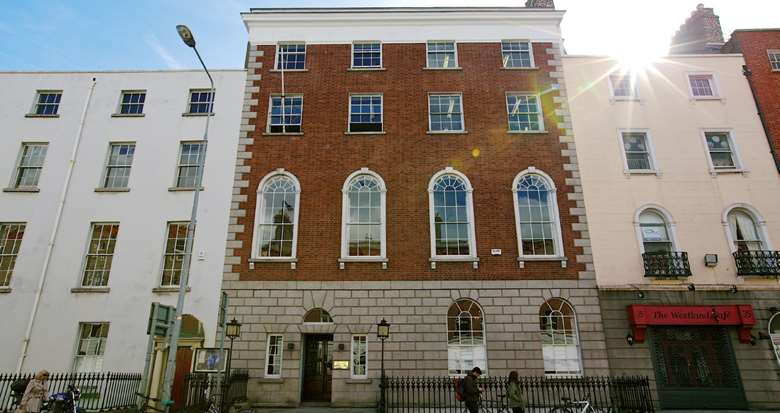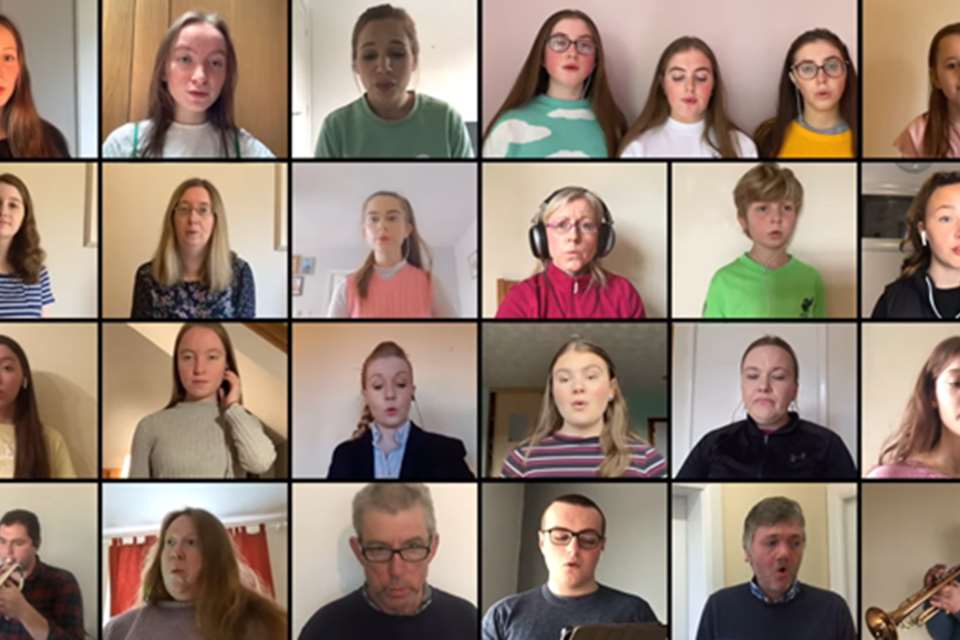RIAM's Adult Division: Lessons for life
Ariane Todes
Sunday, January 1, 2023
The Royal Irish Academy of Music has opened its doors to an unexpected and often overlooked group of music students. Ariane Todes visits the conservatoire's Dublin home to find out about a pioneering new programme.

I am in the front room of a beautiful Georgian town house on a Monday evening listening to a performance. Three violinists are playing a tune for their teacher. It's a simple tune – this is only their third lesson – but they are concentrating hard, and they all make it to the end in one piece. The audience applauds, and they smile proudly.
Now, you may be picturing young children, in which case you’ll need to adjust your image. These violinists are all over the age of 50 and they’re learning the violin for the first time. What makes this even more unusual is that this building is a conservatoire, and not only have they been allowed to use the classrooms, but they come every week as regular students. This is week three of the new Adult Division of Dublin's Royal Irish Academy of Music (RIAM).
Always learning
Some conservatoires may offer the odd evening class or summer course for allcomers, but as far as I’ve been able to find, The Juilliard School in New York is the only other conservatoire to create an entire faculty for adults. The response to RIAM's Adult Division indicates that there is clearly demand. For their first term there are 116 students (average age of applicants 43), taking 36 hours of group lessons across 10 instruments at beginner, intermediate and advanced levels. There is also a Well Sing Choir and courses such as Historical Performance for String Players.
Watching the students play and hearing them talk, it's clear how much they value their classes. One of the violin students tells me: ‘It's exciting to take up a new skill – I’m 52. It's very energising. I look forward to Monday evenings.’ Upstairs, one of the clarinet students says, ‘I started before the pandemic and it was great to be able to play during Covid. I could read music already, but I couldn’t play it at all. I want to play in a group with other people. I love it, but I’ve got a long way to go. I like the concentration, the calmness when I’m practising and the sound when I play with other people.’
How it began
The Adult Division came to life as a natural extension of RIAM's other offerings. It has junior and tertiary departments, but students were coming through the junior department and wanting to continue lessons without taking a degree. Brendan Breslin, Head of RIAM Connect & Outreach, says, ‘We didn’t have the ability to focus on their needs, so for practical reasons we wanted to give them a division of their own. Coupled to that came the idea that continuous professional development, lifelong learning and access to wellbeing through beginner, intermediate and advanced musicianship were all of interest and something we wanted to support.’
Having run short courses before, they knew there was a market for adult lessons, but not necessarily the levels at which to pitch the classes, so they’ve had to take some educated risks, Breslin admits: ‘It was difficult to do any strategic market research because it's such a diverse area in terms of age, interest, level, want and need. It was hard to find that elixir that would work for everybody.’
As a result, the strategy has been a little ‘suck it and see’. They initially advertised for ‘an expression of interest’ in courses to gauge the response. Breslin says: ‘We focused on key areas that we could support from day one. We essentially went out knowing that the opportunity was there but that we would have to find what was coming back at us. It's fair to say that what we thought would come back to us did come back to us – many who were returning and many who were interested in starting, not because they wanted to be on stage, but because they want an impact on wellbeing and social inclusion.’
Moving forward
Looking ahead, he has a flexible approach to what further courses might be offered, in response both to students' needs and to how staff engage. He says, ‘We’re already seeing threads coming through, with staff saying, “We’ve got a course that would fit here,” or “Could we focus on a slightly more advanced level?” Staff are starting to get their heads around what the new division is. It's going to take another two years before they are able to go, “Ah, this is how I can contribute to it.” We’ll build it slow and steady.’
Other potential ideas he mentions include mentorship programmes, micro-credentials, music appreciation courses for primary schools, contemporary music courses, an ‘anything-goes' orchestra and chamber music. The current two terms of 10 weeks could become a three-year accredited programme. The ultimate aim is to be as inclusive as possible, he says: ‘Adult Division shouldn’t be about one typical cross-section of society that has medium to high income. There has to be something for people who maybe don’t have any income at all. That's a challenge for the future but a welcome one that presents opportunities.’
Apart from the practical side of offering specific courses, the significant innovation is simply to have created a category for adults, both physically and conceptually. This both acknowledges their existence (as an amateur myself, I am pathetically grateful for this) and makes it easier for people to find. Marketing manager Mark Mahoney explains: ‘In some ways it's a relaunch of what we’ve been doing under a new name, as well as bringing in new avenues and adding other developments and new audiences. Giving it its own divisional space in the organisation has given the existing activities in that space new energy and visibility. Even things that we'd been delivering previously sit in a clearer place on the website, which is why we’ve seen some of them increase in numbers.’
New facilities
Sitting at the back of the Georgian building that has housed the Academy since 1870 is a spanking new €24 million (£21 million) campus, which includes a new 300-seat recital hall, an opera studio, library and recording facilities, as well as doubling the number of practice rooms and studios. The Adult Division will have access to these spaces, Breslin says: ‘We want to give them access to a good stage in our new campus so that for the first time they can invite family and friends and enjoy that moment.’ Not that this experience is for everyone: ‘For some of them being a musician isn’t about sitting on stage. They just want music in their life, to embody it, to have it in their own house and environment and feel what that's like. They baulk at the idea of being on a concert stage.’
Of course, the bottom line for any institution will always be the bottom line, and in its first term, that seems to be healthy. Breslin says, ‘It is profitable, primarily because of the group model. One of the things we said at the very start was that we wanted to reduce the cost per individual, but there's a threshold – there have to be at least two within a room for that class to be profitable, so that it's not expensive for them but there's a value for the Academy. We’ve turned what came at a cost, because it was subsidised by the government, into something that is now starting to bring in some degree of income, with a view to developing that space a little more.’
What advice does he offer to other conservatoires who might be considering the idea of an adult division? ‘The first thing is you do have to understand what's around you in terms of culture and society. I don’t think our model would work everywhere, but a version of it will work to a degree. Once you understand your own area and environment, that is in itself the first step. For anybody in a different conservatoire, is there an ability to make good and lasting impact?’
He also sees a moral imperative in what RIAM is doing. He explains: ‘There are a lot of schools of music across the country that are doing good practice in this area, but we are the country's most well-established school of music and are better placed to show that it can be done. I don’t think we’ll see the societal impact until we, as the top of that tier, say, “This can be done. These are the people who surround you. Here's what they want. Here are the conversations they want to have. Here are the elderly settings you can go into, the care centres, the people who want music in their lives. If we’re able to do it in this model then maybe you are as well.” Then systemically you start to see the wider impact.’
The ultimate goal? ‘I would hope that in 10 years' time schools of music have adopted the same model, saying “this works and now we’re sustaining a full cross-section of our community.”’ A hope for the future, indeed.


